Unhappy About Ukraine War, More And More Moldovan Priests Are Leaving Russian-Led Orthodox Church
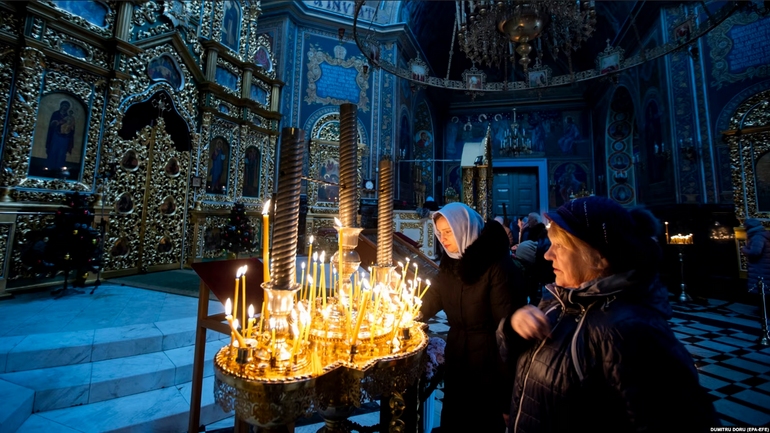
By Denis Dermenji, Eugenia Apostu, Andy Heil
He and a handful of other Orthodox priests, Pelin says, leaning in for emphasis, are victims of "a public execution." The priests were stripped of their authority last month by the synod of the Metropolis of Chisinau and All Moldova -- the Russian-led church better known as the Moldovan Orthodox Church -- after they joined an Eastern Orthodox rival that is subordinate to the Romanian Orthodox Church.
The priests defected largely because they were unhappy about the Russian Orthodox Church's support for the war in Ukraine. "I'm sure they did it to scare other priests who are on the same path," said Pelin, the 50-year-old parish priest at St. Archangel Michael Church in the village of Dubasarii Vechi, 40 kilometers east of the capital, Chisinau. "There are quite a few [of them on that path]," he told RFE/RL's Moldovan Service.
Around 50 priests whose obedience seemed unshakable before Russia's full-scale invasion of Ukraine in February 2022 have defected this year from the Moldovan Orthodox Church, which is canonically subordinate to the Moscow Patriarchate and is thought to serve around 90 percent of Moldova's Orthodox population. All of the priests -- some quietly, some very publicly -- have joined the Romanian Orthodox Church's autonomous local diocese in Moldova, known as the Metropolis of Bessarabia.
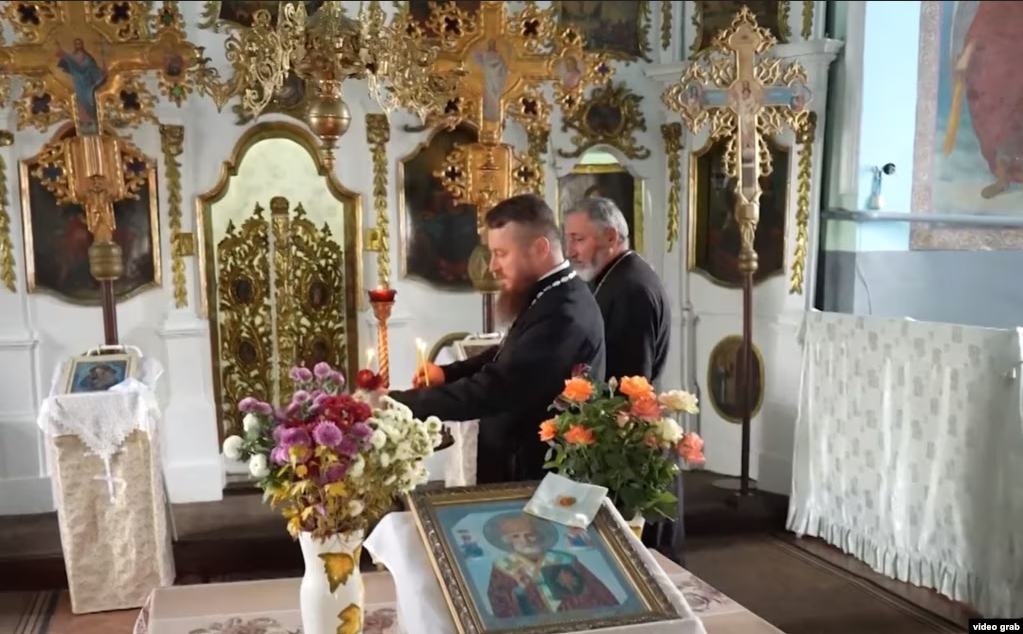
The defections are a good indication of the groundswell of anti-war sentiment among Moldovans -- fueled by Moldova's pro-European political leadership -- and the widespread frustrations among clergy with the Russian Orthodox Church's "promotion of pro-Russian interests."
'Waiting For The Metropolis To Take A Stance'
After tens of thousands of Russian troops poured over the border into Ukraine 20 months ago, Vasile Enache, another Moldovan priest who has since embraced the Metropolis of Bessarabia, says he was waiting for a sign.
None came. "I didn't hear any statements from our [church] leadership...about this disaster that had started," said Enache, who has spent 32 years as a parish priest at St. Hierarch Nicholas Church in the village of Isnovat, 40 kilometers north of the capital, Chisinau. "We, the priests, were waiting for the Metropolis to take a stance," Enache told RFE/RL's Moldovan Service.
Rather than preaching peace and reconciliation, some of the Moldovan Orthodox Church's senior clergy had been speaking out in defense of the Russian invasion. One of the most outspoken among them was Marchel Mihaescu, the bishop of Balti and Falesti and one of the country's most influential priests. He called Russia "the guardian of Christian values," criticized Europe, and spoke out against LGBT lifestyles and other cultural touchstones that align with Kremlin policies and criticism of the West.
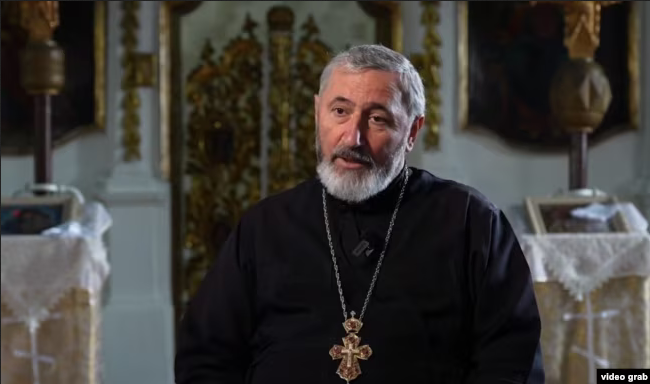
For Enache, 68, it was all too much and, on August 18, he joined the Metropolis of Bessarabia along with Pelin and four others. The Metropolis of Bessarabia has accused its bigger rival of promoting a Russian world view and has called the withdrawal of ecclesiastical status for the defector priests "absurd and ridiculous."
"At the time we joined [the Bessarabian church], we hadn't been expelled," Enache said. "We voluntarily joined the Metropolis of Bessarabia, our own metropolis, and the Metropolis of Bessarabia wasn't canonically prohibited." But five days after joining the rival church, Enache was stripped of his authority by the Metropolis of Chisinau and All Moldova.
Vladimir And Vulnerability
Metropolitan Vladimir -- the head of the Moldovan Orthodox Church and the Russian Orthodox Church's top cleric in Moldova -- had previously been at pains to maintain neutrality, with his public statements mostly encouraging peace and an end to a "fratricidal war." But after more defections and pressure from Moldovan congregations , Vladimir complained to Moscow, saying that the senior Russian clergy's outspoken support for an unpopular war in Ukraine was costing it souls.
In a September 5 letter addressed to Patriarch Kirill, the head of the Russian Orthodox Church, which was leaked more than a month later by a former Moldovan lawmaker with close ties to the Metropolis of Bessarabia, Vladimir said that perceptions of the Russian church as "a Kremlin outpost and a champion of the Russian invasion of Ukraine" threatened to ruin the Moldovan Orthodox Church and would drive its priests and worshipers into the arms of its Romanian rival. The church leader accused Russia's civil and religious authorities of treating Moldovans as "a peripheral and spineless people" and the Moscow Patriarchate of trying to "fold Moldova into a Russian world to which it is alien."
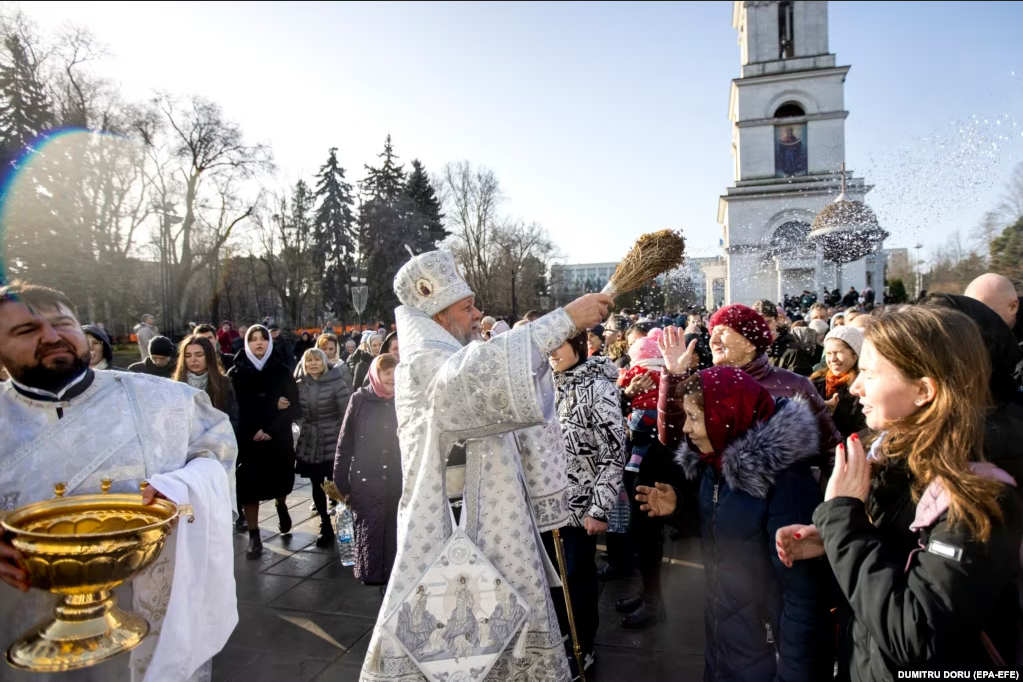
In his letter to Kirill, however, Vladimir warned that to ensure its survival and avoid being pushed "to the periphery of Moldovan society" in the face of "urgent circumstances," his Metropolis of Chisinau and All Moldova must cut its ties to Moscow. "This is a direct result of our connections as a church structure with the promotion of pro-Russian interests in the Republic of Moldova," said Vladimir, whose lay name is Nicolae Cantarean.
It was a striking departure for the 71-year-old metropolitan, who just weeks earlier had initiated the ban on Pelin and the other priests and was seen as taking an indulgent line on senior members of his flock supporting the Russian invasion. Vladimir is a member of the Russian Orthodox Church's Holy Synod, its supreme governing body, and is said to be close to Patriarch Kirill.
Metropolitan Vladimir was born in Ukraine and, in addition to Romanian and Moldovan citizenship, has a Russian diplomatic passport. He was awarded Russia's Order of Friendship by President Vladimir Putin in 2018, has openly expressed his support for pro-Russian parties contesting Moldovan elections, and has opposed the Romanian Orthodox Church's revival of the Metropolis of Bessarabia.
Sergei Chapnin, a former editor in chief of the Russian Orthodox Church's official newspaper and a senior fellow at Fordham University's Orthodox Christian Studies Center, told RFE/RL's Moldovan Service that the letter was an "extremely unpleasant surprise" for Kirill and an attempt to "formalize a divorce in a cultural manner."
"If we translate the language of church diplomacy into ordinary language, the message to Patriarch [Kirill] sounds extremely harsh: 'We are leaving the Moscow Patriarchate and you have no opportunity to influence our decision,'" Chapnin said. Predicting that "a breakup is inevitable" despite Kirill's almost certain rejection of Vladimir's arguments, Chapnin says the Moldovan metropolitan's appeal is a recognition of the "new reality" of improving political and ecclesiastical relations between Moldova and Romania.
'One Nation, One Church'
With the war in Ukraine showing no signs of ceasing, Russia is running the risk of losing control -- or at least influence -- over other national Orthodox churches in the region.
"In a nutshell, Orthodox institutional life is primarily organized under the premise of one nation, one church," said Catherine Wanner, a professor of history and religious studies at The Pennsylvania State University. She recently authored the book Dispossession: Anthropological Perspectives On Russia's War Against Ukraine.
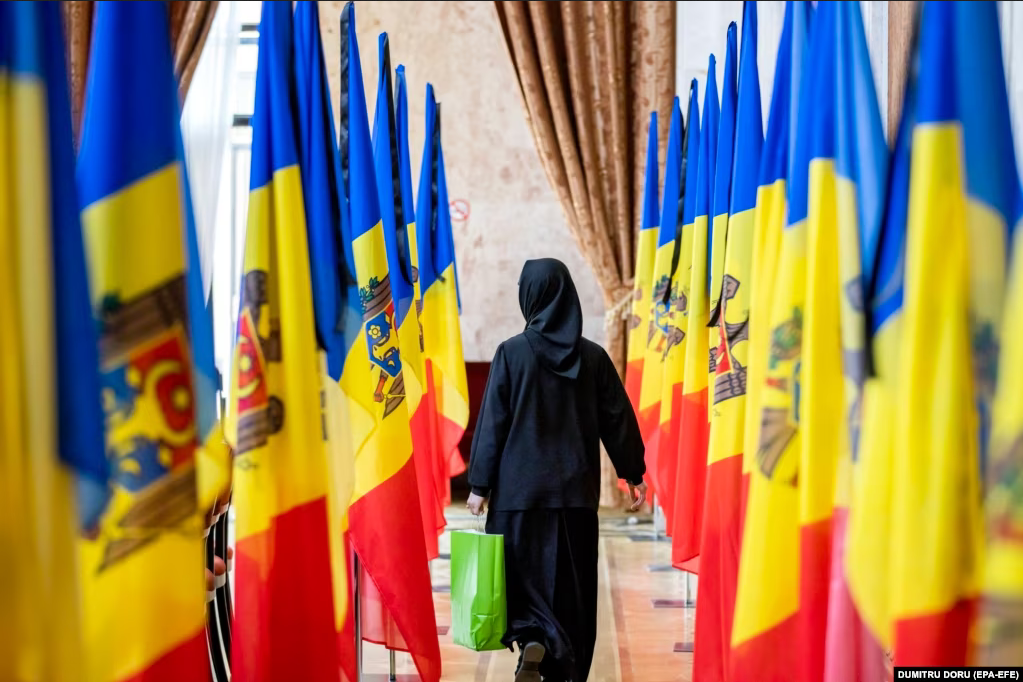
She cites the Romanian, Bulgarian, and Greek examples in the region, as well as the Ecumenical Patriarchate in Istanbul -- the seat of the global spiritual leader of Orthodox Christians -- granting autocephaly to the Orthodox Church of Ukraine in 2019. That move came nearly three decades after Ukrainian independence but less than five years after Moscow's forced annexation of Crimea and with Russia backing armed separatists elsewhere in eastern Ukraine.
"The real exception to this idea of 'one nation, one church' was the Russian Orthodox Church, because its canonical territory mapped onto former Russian imperial territory," Wanner said, adding that the war creates "extraordinary tensions" for Orthodox churches in places like Ukraine or Moldova. "By that I mean Orthodox churches that are institutionally still connected with the Moscow Patriarchate and with the Russian Orthodox Church," she said. "I think people who live in Moldova realize they're probably also very vulnerable."
In comments made by Kirill and other high-level clergy in the Russian Orthodox Church, Wanner says there has been a "rapid escalation" in tone after the 2022 invasion of Ukraine. "The Russian Orthodox Church endorses -- and in fact legitimizes and justifies -- the war and uses religious concepts to do so."
Chisinau-based political analyst Nicolae Negru says the Moldovan metropolitan's letter is really aimed at their Moldovan parishioners and is meant to say: "'We are with you...[so] don't think we belong to those who wouldn't want peace, who would want war,' and, 'We understand that, in fact, we belong to the European world.'"
"Such a thing was unimaginable before the war in Ukraine," Negru added.
Priests Playing Politics
Tatiana Cojocari, a researcher at the Romanian Center for Russian Studies who specializes in the Russian Orthodox Church's role in post-Soviet foreign policy, suggests that public debate around the status of the church in Moldova is being shaped "by political leaders [inside and outside the country] and not by society itself."
Moldovan priests certainly aren't above politics. Cojocari said that the local clergy might decide "not because of ideological reasons but purely pragmatic ones" that subordination to the Russian Orthodox Church "is not so convenient for them" right now. "This is the main issue that raises concern for Metropolitan Vladimir -- losing a number of parishes and thus losing the Metropolis of Chisinau and All Moldova status as the main 'national' church" in the country, Cojocari said.
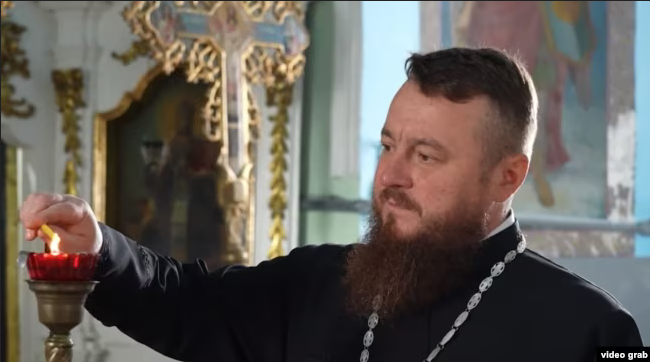
Church leaders, she suggests, are also aware of the risks of impeding government progress in the "polarized" relations between East and West. In the early months following Russia's 2022 invasion of Ukraine, Moldova's pro-Western President Maia Sandu used meetings with Metropolitan Vladimir and Metropolitan of Bessarabia Petru Paduraru to argue that "The state and the church must act in solidarity."
In the shadow of war, Sandu and successive Moldovan governments have accelerated Chisinau's bid for EU membership, alongside similar pushes from regional neighbors Ukraine and, to a lesser extent, Georgia. Last month, Moldovan authorities clamped down further on what they describe as a major Russian disinformation campaign, blocking over 20 websites more than a year after they banned news and other Russian-produced TV programs they saw as controversial.
Last week, after the disclosure of Metropolitan Vladimir's implied threat to Moscow, President Sandu repeated her desire for "everyone" to work toward "peace and European integration." She also stressed that "the state cannot interfere in church affairs," yet reportedly told Vocea Basarabiei TV that the "church must operate according to the interests of the state and its citizens." Sandu's office did not respond to RFE/RL's requests for further comment.
Threat To Moscow's Primacy
Russian Patriarch Kirill has yet to respond publicly to Vladimir's letter, and it's unclear how seriously he regards the threat or how far the Moldovan metropolitan is prepared to go.
In another blow to Moscow's primacy in religious affairs in the region, neighboring Bulgaria expelled the local head of the Russian Orthodox Church, Archimandrite Vasian, and two other church officials in September for allegedly undermining Bulgarian "national security and interests." In response, Moscow lashed out at Sofia and the Russian church locked the doors of the Church of St. Nicholas the Miracle-Maker in the Bulgarian capital, shutting out worshipers and reigniting a century-old property dispute.
The Bulgarian expulsions followed Vasian's deportation days earlier from North Macedonia amid suggestions that he was fomenting schism in the Macedonian Orthodox Church, another autonomous Eastern Orthodox church.
That said, Cojocari is skeptical of how much impact Vladimir's move will have in the region for the Russian Orthodox Church, already weakened by its support for the Ukrainian invasion. "In that context it was expected that a new window of opportunity would appear for other churches from the region to try increasing their influence and separate from the Russian church. The Russian Orthodox Church is already at risk and Vladimir knows that," Cojocari said.
She says the Moldovan priests' defection is significant "because it can create a precedent, a trend." And Vladimir might still "find a middle path," although sweeping changes require "strong political support and several years of preparation." "Are they ready to [take on] this long-term project? Do they have public support to act smoothly without societal tensions?" Cojocari asked. "It is not clear yet."
As Moldova's pursuit of EU membership intensifies and Russia's unpopular war grinds on next door in Ukraine, the ranks could grow of priests who, like Pelin and Enache, feel an increasing desire to lead their parishioners away from the "Russian world." RFE/RL's Moldovan Service has learned that an estimated 60 priests from the Moldovan Orthodox Church are likely to defect to the Metropolis of Bessarabia in the coming weeks.
"We didn't do anything extraordinary," Pelin said, referring to his defection to the Bucharest-based church. "We corrected a mistake of history. We have nothing in common with Russia. We don't even have a shared border between our countries."
According to Pelin, the Moldovan Orthodox Church stripping him and the other priests of his authority was "regrettable and unjust," "absurd," and carried out in "revenge"
"We were accused of voluntarily leaving for another patriarchate," Pelin said. "Show us where we left to. In the end, we didn't go anywhere. We're [still] in our churches, with our communities, so applying the canon of departure is a distorted interpretation."









